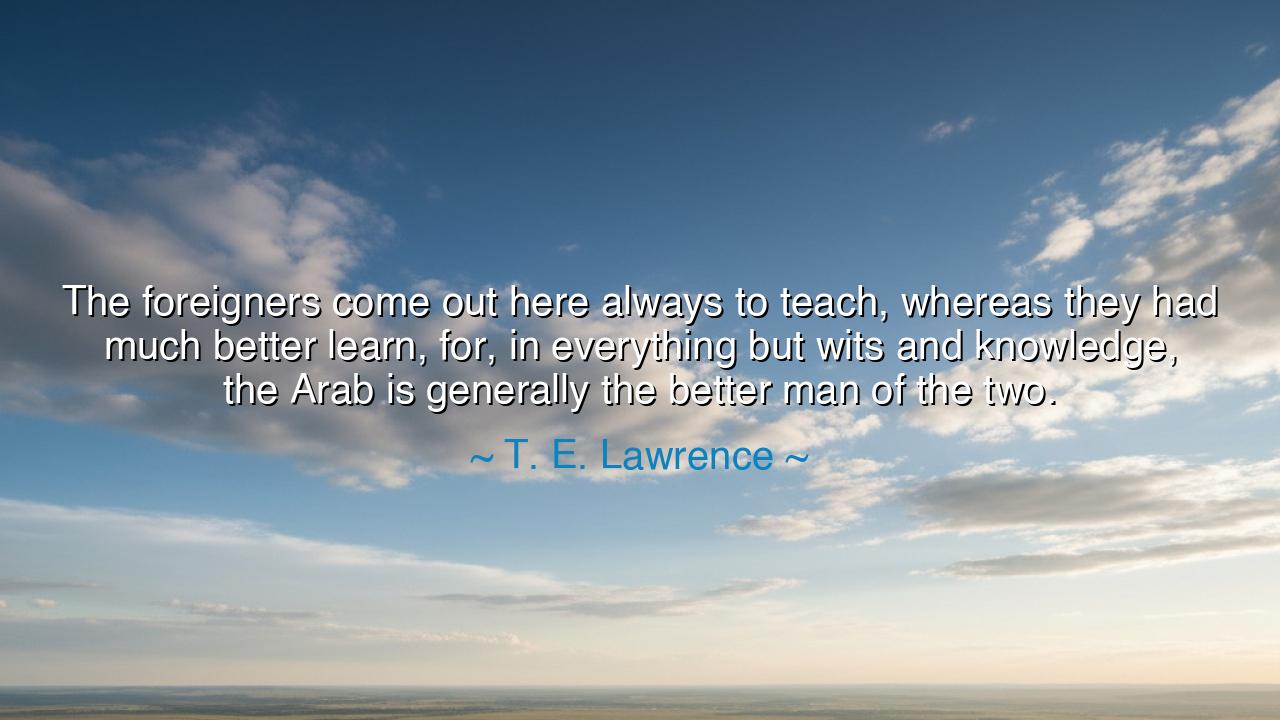
The foreigners come out here always to teach, whereas they had
The foreigners come out here always to teach, whereas they had much better learn, for, in everything but wits and knowledge, the Arab is generally the better man of the two.






“The foreigners come out here always to teach, whereas they had much better learn, for, in everything but wits and knowledge, the Arab is generally the better man of the two.” Thus spoke T. E. Lawrence, the soldier-scholar whom the world came to know as Lawrence of Arabia, a man who walked the line between two civilizations and saw the truth that lay between them. His words were not merely a reflection on his time in the Arabian desert during the Great War, but a timeless meditation on humility, culture, and the blindness of pride. In these few lines, he speaks against the arrogance of empire — against the conceit that one people might arrive in another’s land as masters, bearing lessons, when in truth they have much yet to learn.
Lawrence wrote from experience hard-earned beneath the burning sun of Arabia. He had joined the Arab Revolt not as a conqueror, but as a companion, riding beside Bedouin tribesmen in their struggle for freedom against the Ottoman Empire. There, among the dunes and the tents, he came to see that the foreigners — the Europeans — though they possessed machines, books, and modern science, lacked something that the desert-born held in abundance: character, discipline, and dignity. The Arab, he found, might not be trained in the schools of the West, but he lived in harmony with his land, bound by honor, patience, and courage. And so Lawrence came to say that the foreigners, who came with the pride of teachers, would do better to arrive as students — for there was much in the East that the West had forgotten.
At the heart of his wisdom lies the difference between knowledge and wisdom. Knowledge, as Lawrence saw it, is the accumulation of facts — it can be carried in books, in machines, in clever speech. But wisdom is lived — it is carried in the soul, shaped by hardship, humility, and the rhythm of life itself. The foreigners came armed with knowledge but starved of wisdom; the Arabs, by contrast, possessed a wisdom that came from endurance, from understanding the language of the desert, from knowing when to move and when to wait. “In everything but wits and knowledge,” said Lawrence, “the Arab is the better man.” He meant that there are virtues which no university can teach — courage in suffering, loyalty in friendship, and grace in simplicity — and that to truly know the world, one must learn from those who live closest to it.
Consider the story of Lawrence himself during the campaign of Aqaba in 1917. The British high command doubted the Arab forces could cross the endless sands and strike from the desert. But Lawrence had learned from his Arab companions — from Auda Abu Tayi and others — that the desert, though harsh, was a friend to those who understood it. Trusting their counsel, he joined them in a daring march through uncharted wilderness, leading to one of the most remarkable victories of the war. That triumph did not come from Western planning or superior weaponry, but from listening — from the humility to follow the guidance of men whom Europe had long dismissed as inferior. It was proof that the one who comes to learn is greater than the one who comes to command.
Lawrence’s words strike deeper still, for they are not only about Arabs and foreigners, but about all encounters between peoples, between nations, and even between individuals. They warn against the arrogance that blinds the mind and hardens the heart. The one who assumes he has nothing to learn will never discover truth; the one who believes others have nothing to teach will remain forever ignorant. Every culture, every soul, holds a fragment of wisdom, and only through humility can these fragments be joined into something whole. Thus, the wise man does not rush to instruct, but first to listen — for only in listening does he earn the right to speak.
The spirit of Lawrence’s teaching echoes across the centuries. The same arrogance he saw in his time can be found wherever the powerful believe they alone hold the light of civilization. Empires have risen and fallen upon this illusion — from Rome to Britain, from Europe to the modern world — each thinking itself the teacher of mankind, only to find that wisdom cannot be imposed. It must be shared, nurtured, exchanged. Cultural humility is the mother of understanding, and understanding the father of peace. The proud may conquer lands, but the humble conquer hearts.
So, my children, let this lesson take root in your souls. When you walk among those who are different from you — in language, in custom, in belief — do not come as one who knows, but as one who seeks. Be not the foreigner who teaches, but the pilgrim who learns. Honor the wisdom of others, for it may complete what is lacking in yourself. The desert teaches endurance, the mountain teaches silence, the sea teaches patience — and so too does every people under heaven hold a lesson for those humble enough to learn it.
For as T. E. Lawrence reminds us, pride builds walls, but humility builds bridges. The true measure of a man’s greatness lies not in how much he can teach, but in how deeply he can listen and how willing he is to learn. Therefore, let us go into the world as students of life, not masters of it — and in that sacred exchange of learning, we shall find the unity of the human spirit that no empire can conquer, and no desert can divide.






AAdministratorAdministrator
Welcome, honored guests. Please leave a comment, we will respond soon